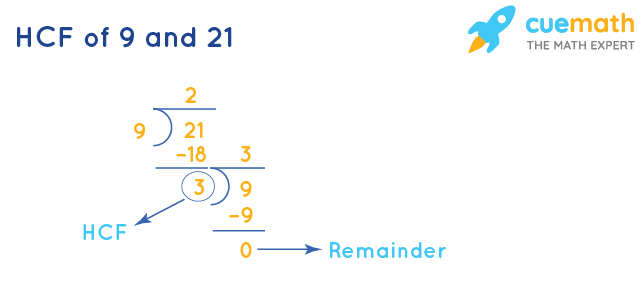HCF of 9 and 21
HCF of 9 and 21 is the largest possible number that divides 9 and 21 exactly without any remainder. The factors of 9 and 21 are 1, 3, 9 and 1, 3, 7, 21 respectively. There are 3 commonly used methods to find the HCF of 9 and 21 - long division, prime factorization, and Euclidean algorithm.
| 1. | HCF of 9 and 21 |
| 2. | List of Methods |
| 3. | Solved Examples |
| 4. | FAQs |
What is HCF of 9 and 21?
Answer: HCF of 9 and 21 is 3.

Explanation:
The HCF of two non-zero integers, x(9) and y(21), is the highest positive integer m(3) that divides both x(9) and y(21) without any remainder.
Methods to Find HCF of 9 and 21
The methods to find the HCF of 9 and 21 are explained below.
- Using Euclid's Algorithm
- Long Division Method
- Prime Factorization Method
HCF of 9 and 21 by Euclidean Algorithm
As per the Euclidean Algorithm, HCF(X, Y) = HCF(Y, X mod Y)
where X > Y and mod is the modulo operator.
Here X = 21 and Y = 9
- HCF(21, 9) = HCF(9, 21 mod 9) = HCF(9, 3)
- HCF(9, 3) = HCF(3, 9 mod 3) = HCF(3, 0)
- HCF(3, 0) = 3 (∵ HCF(X, 0) = |X|, where X ≠ 0)
Therefore, the value of HCF of 9 and 21 is 3.
HCF of 9 and 21 by Long Division

HCF of 9 and 21 is the divisor that we get when the remainder becomes 0 after doing long division repeatedly.
- Step 1: Divide 21 (larger number) by 9 (smaller number).
- Step 2: Since the remainder ≠ 0, we will divide the divisor of step 1 (9) by the remainder (3).
- Step 3: Repeat this process until the remainder = 0.
The corresponding divisor (3) is the HCF of 9 and 21.
HCF of 9 and 21 by Prime Factorization
Prime factorization of 9 and 21 is (3 × 3) and (3 × 7) respectively. As visible, 9 and 21 have only one common prime factor i.e. 3. Hence, the HCF of 9 and 21 is 3.
☛ Also Check:
- HCF of 324 and 144 = 36
- HCF of 6 and 9 = 3
- HCF of 255 and 867 = 51
- HCF of 870 and 225 = 15
- HCF of 441, 567 and 693 = 63
- HCF of 36 and 48 = 12
- HCF of 15 and 20 = 5
HCF of 9 and 21 Examples
-
Example 1: Find the HCF of 9 and 21, if their LCM is 63.
Solution:
∵ LCM × HCF = 9 × 21
⇒ HCF(9, 21) = (9 × 21)/63 = 3
Therefore, the highest common factor of 9 and 21 is 3. -
Example 2: For two numbers, HCF = 3 and LCM = 63. If one number is 21, find the other number.
Solution:
Given: HCF (x, 21) = 3 and LCM (x, 21) = 63
∵ HCF × LCM = 21 × (x)
⇒ x = (HCF × LCM)/21
⇒ x = (3 × 63)/21
⇒ x = 9
Therefore, the other number is 9. -
Example 3: Find the highest number that divides 9 and 21 exactly.
Solution:
The highest number that divides 9 and 21 exactly is their highest common factor, i.e. HCF of 9 and 21.
⇒ Factors of 9 and 21:- Factors of 9 = 1, 3, 9
- Factors of 21 = 1, 3, 7, 21
Therefore, the HCF of 9 and 21 is 3.

FAQs on HCF of 9 and 21
What is the HCF of 9 and 21?
The HCF of 9 and 21 is 3. To calculate the HCF (Highest Common Factor) of 9 and 21, we need to factor each number (factors of 9 = 1, 3, 9; factors of 21 = 1, 3, 7, 21) and choose the highest factor that exactly divides both 9 and 21, i.e., 3.
If the HCF of 21 and 9 is 3, Find its LCM.
HCF(21, 9) × LCM(21, 9) = 21 × 9
Since the HCF of 21 and 9 = 3
⇒ 3 × LCM(21, 9) = 189
Therefore, LCM = 63
☛ Highest Common Factor Calculator
How to Find the HCF of 9 and 21 by Long Division Method?
To find the HCF of 9, 21 using long division method, 21 is divided by 9. The corresponding divisor (3) when remainder equals 0 is taken as HCF.
How to Find the HCF of 9 and 21 by Prime Factorization?
To find the HCF of 9 and 21, we will find the prime factorization of the given numbers, i.e. 9 = 3 × 3; 21 = 3 × 7.
⇒ Since 3 is the only common prime factor of 9 and 21. Hence, HCF (9, 21) = 3.
☛ Prime Number
What is the Relation Between LCM and HCF of 9, 21?
The following equation can be used to express the relation between Least Common Multiple and HCF of 9 and 21, i.e. HCF × LCM = 9 × 21.
What are the Methods to Find HCF of 9 and 21?
There are three commonly used methods to find the HCF of 9 and 21.
- By Long Division
- By Euclidean Algorithm
- By Prime Factorization
visual curriculum
